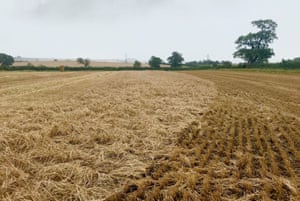A borrowed yellow combine lurks behind a hedge, where it was left at 10 o’clock last night. My friend Richard Hudson, the farmer, had worked 17 hours on his birthday. “We were determined to keep going because we knew the weather was coming,” he says. “But eventually the machines couldn’t cope. I mean, look at it.” Barley stems, toppled every which way by wind last week, have been laid lower still by hammering rain.
Richard plants spring crops because it’s better for the environment and his cash flow, he tells me. “They need lower inputs, we can drill direct so we don’t have to plough, and we can leave winter stubble – it suits this land, and the skylarks especially. But it’s a risk.”
The dry spring was brutal for farming: growth stalled and many spring-sown crops nearly died. Rain eventually revived them but secondary stems put out by recovering plants matured a full month after the primary shoots. The earlier heads litter the ground, having dropped while Richard waited for the rest to ripen, but now there is a risk of losing the lot. It is his worst harvest in 14 years.

In another field, there is chaos of a different kind. Around a central crop of millet and sunflowers – a winter bird banquet – there is a 10-metre-wide, waist-deep tangle of clover, vetch, poppies, melilots and milk thistle, sown for pollen and nectar. Wading in, my jeans are soon soaked. I crouch and push aside a sodden thatch of vetch, loosing a small explosion of white moths. And beneath the thatch – oh! It’s a forest in miniature, with wildflower stems instead of soaring trunks, and gnats flying among them like tiny birds. The air there is warm, humid and perfectly still. The soil between the stems is bare, but peppered with seeds. This is where hope has hunkered down.
As I leave, a handful of finches burst from one of the broad, shaggy hedges. Their trajectory is that of broadcast seed, a low, fast, dispersive arc. Then the wind catches them and whisks them away in a formation too loose to be a flock, each bird riding its own flume of air over the storm-battered fields.